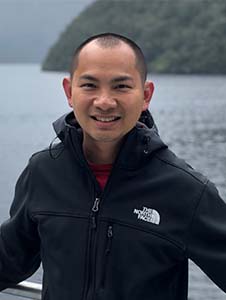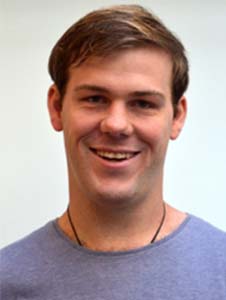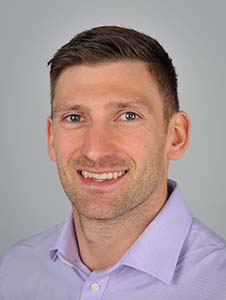Wednesday 20 October 2021 9:44am
In August this year, 15 early and mid-career researchers received an Accelerator Grant from the Division of Health Sciences. These Grants are intended to enhance the career development of some or our extraordinary early and mid-career researchers. This was the first year these Accelerator Grants have been awarded.
Over the next few weeks, we will run a series of articles highlighting these talented early and mid-career researchers from the Division of Health Sciences.
Today, we provide more insight into the projects of recipients Dr Erik Wibowo, Dr George Wiggins and Dr Tim Chambers.
Dr Erik Wibowo

Dr Erik Wibowo
Dr Erik Wibowo is a Lecturer in Clinical Anatomy, with the Department of Anatomy.
He is currently teaching anatomy of the abdomen to medical students, as well as musculoskeletal anatomy and male reproduction topics to undergraduate science students. His diverse research includes behavioural endocrinology (how hormones affect behaviours), prostate cancer patients' survivorship issues, and students' wellbeing.
The project that has received the Accelerator Grant funding from the Division of Health Sciences will assist Dr Wibowo's research to investigate various factors that may be associated with academic stress of Pasifika students in the Department of Anatomy. This project is a collaboration with graduate student Saane Fakapulia, and Dr Latika Samalia, a Professional Practice Fellow in the Department of Anatomy. Support has also been provided by the Biomedical Otago Pacific Students Society to help in recruiting participants.
“Dr Samalia and I are the Pasifika students' liaisons in the Department of Anatomy, and we are both members of the Pacific Strategic Framework Group in the School of Biomedical Sciences. We became aware that many Pasifika students have challenges during their study in Otago. For example, if they're not from Dunedin, they may need to adjust to a new living situation and cultures in Otago, which may not be the same as their homes. Therefore, we feel the importance of supporting Pasifika students in our Department. We hope that our research can be used to develop ways to alleviate their academic stress.”
The intention is to use data from this research to improve the support structure for Pasifika students in Anatomy.
Dr Wibowo is originally from Indonesia. He completed undergraduate studies at the University of Sydney, then moved to Dalhousie University in Halifax (Canada) for his PhD in Anatomy and Neurobiology. Following this, he went to the Vancouver Prostate Centre for his post-doctoral fellowship, where he coordinated an educational programme (on side effects management) for prostate cancer patients and their partners.
Dr George Wiggins

Dr George Wiggins
Dr George Wiggins is a Postdoctoral Research Fellow in the Mackenzie Cancer Research group, studying cancer genetics at the University of Otago, Christchurch.
This Accelerator Grant has provided funding for Dr Wiggins to extend on findings generated from his PhD. He is investigating how DNA variants alter the expression of genes and their functions during the development of breast tumours.
“Understanding mechanisms of disease risk is critical to developing prevention strategies that minimise disease burden.
By combining studies of genes, hormones and breast cancer development, the results of these experiments will generate pilot data that will be used for future grant applications.”
Traditionally, certain variants were not looked at in great detail because they were believed to be in the “non-coding” region, which meant they were highly unlikely to be associated with disease mechanism.
However, Dr Wiggins decided to pursue in this area. He developed a method using tissue-specific data, which allowed him to identify genes with variable expression, in association with breast cancer risk. Through this method, he has found that individuals who have breast cancer risk have increased variability in genes involved in hormonal synthesis and a decrease in gene expression associated with the RNA methylation processes.
Dr Wiggin's research will now progress with designing a procedure to measure the level of RNA methylation in cells.
Doctor Wiggins' undergraduate and postgraduate studies have all been undertaken at the University of Otago. He completed a Bachelor and a Master's in Science, majoring in Biochemistry at the Dunedin campus, before becoming an Assistant Research Fellow. He then moved to the Christchurch campus where he worked as an Assistant Research Fellow and completed his PhD in the Mackenzie Cancer Research Group. He began his post-doctoral studies in 2021.
Dr Tim Chambers

Dr Tim Chambers
Dr Tim Chambers is a Senior Research Fellow in the Health, Environment and Infection Research Unit at the University of Otago, Wellington.
He has a research background in non-communicable diseases associated with unhealthy commodities industries, e.g., junk food, gambling, and alcohol. However, during his time as a Fulbright scholar at Harvard University he gained a new perspective. ”As the impacts of climate change and environmental degradation have started to emerge, there is a growing need for more public health investment in addressing the associated health impacts.”
His research includes investigating the public health impacts of contaminated drinking water, and he is currently looking at the links between nitrate and adverse health outcomes.
The Accelerator Grant has been used to support a bigger grant application to the Health Research Council to investigate the relationship between nitrate in drinking water and preterm births.
“This research project is important because access to clean, healthy drinking water is a basic human right. There is growing evidence that nitrate contamination is linked with many adverse health outcomes. Very few countries are able to conduct a robust epidemiological study to investigate these connections. We are well placed to add to the global evidence base and provide local robust evidence to policy makers to make informed decisions about water protection and drinking water standards,” Dr Chambers says.
The project team will collate information from water supplies. Using an Integrated Data Infrastructure approach, they will identify all pre-term births from 2008 onwards and attribute a nitrate exposure based on data collected via registered water supplies and from modelling conducted in collaboration with NIWA and the Ministry for the Environment.
Dr Chambers is also working on an alcohol modelling intervention study looking at the potential health benefits of alcohol interventions on tax, availability, and marketing. He has also recently completed studies investigating digital contact tracing technologies as part of the COVID-19 response.
